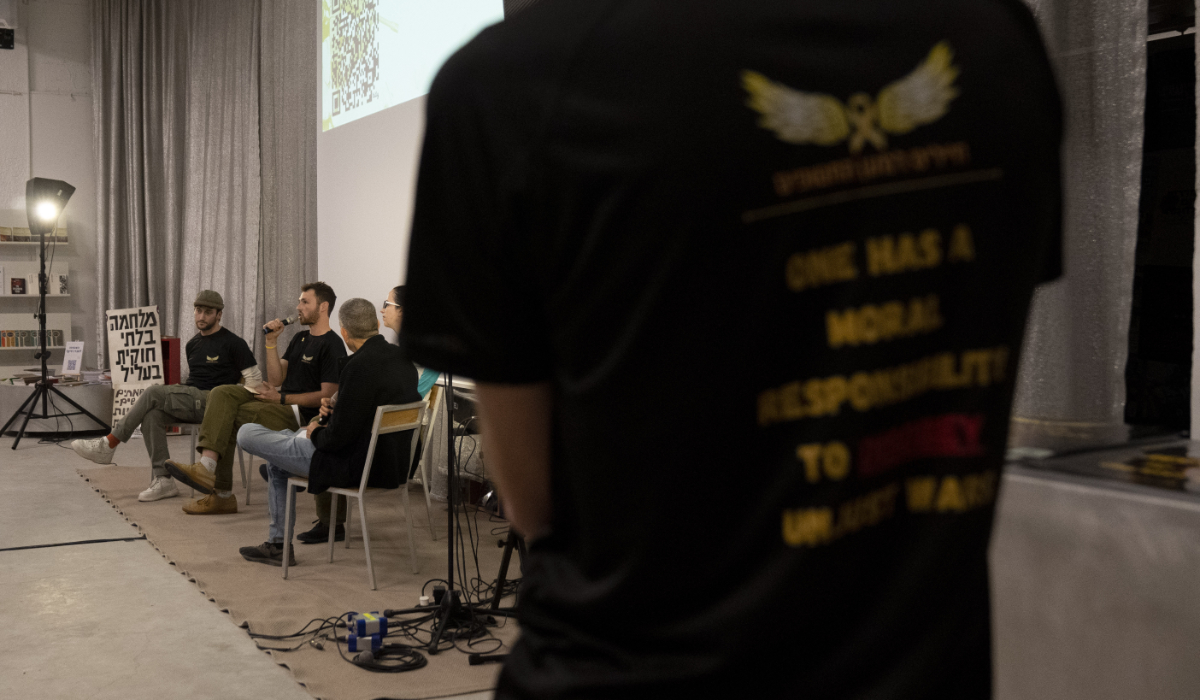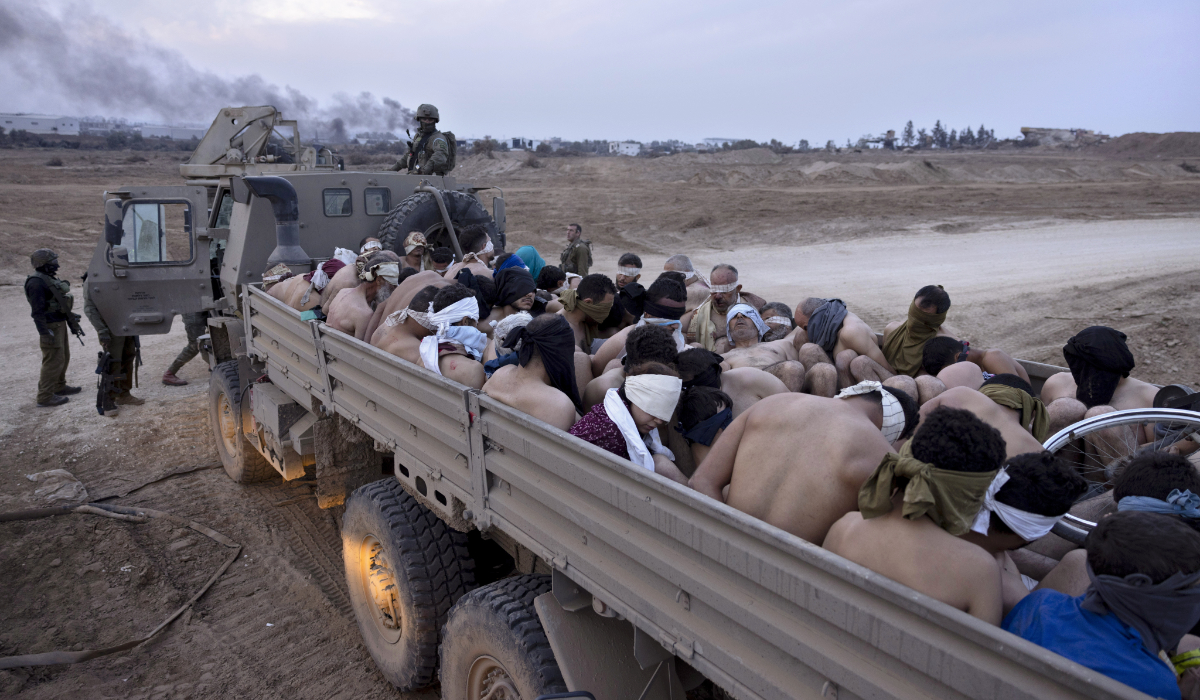JERUSALEM: Yotam Vilk says the image of Israeli soldiers killing an unarmed Palestinian teenager in the Gaza Strip is seared in his mind.
An officer in the armored corps, Vilk said the instructions were to shoot any unauthorized person who entered an Israeli-controlled buffer zone in Gaza. He saw at least 12 people killed, he said, but it is the shooting of the teen that he can’t shake.
“He died as part of a bigger story. As part of the policy of staying there and not seeing Palestinians as people,” Vilk, 28, told The Associated Press.
Vilk is among a growing number of Israeli soldiers speaking out against the 15-month conflict and refusing to serve anymore, saying they saw or did things that crossed ethical lines. While the movement is small — some 200 soldiers signed a letter saying they’d stop fighting if the government didn’t secure a ceasefire — soldiers say it’s the tip of the iceberg and they want others to come forward.

Destroyed buildings inside the Gaza Strip are seen from southern Israel, on Tuesday, Jan. 7, 2025. (AP)
Their refusal comes at a time of mounting pressure on Israel and Hamas to wind down the fighting. Ceasefire talks are underway, and both President Joe Biden and President-elect Donald Trump have called for a deal by the Jan. 20 inauguration.
Seven soldiers who’ve refused to continue fighting in Gaza spoke with AP, describing how Palestinians were indiscriminately killed and houses destroyed. Several said they were ordered to burn or demolish homes that posed no threat, and they saw soldiers loot and vandalize residences.
BACKGROUND
Several soldiers said they were ordered to burn or demolish homes that posed no threat, and they saw soldiers loot and vandalize residences.
Soldiers are required to steer clear of politics, and they rarely speak out against the army. After Hamas stormed into Israel on Oct. 7, 2023, Israel quickly united behind the war launched against the militant group. Divisions here have grown as the war progresses, but most criticism has focused on the mounting number of soldiers killed and the failure to bring home hostages, not actions in Gaza.

Yuval Green, center, and Yotam Vilk, left, take part in a panel discussion for soldiers refusing to serve in the Gaza Strip, in Tel Aviv, Israel, on Tuesday, Jan. 7, 2025. (AP)
International rights groups have accused Israel of war crimes and genocide in Gaza. The International Court of Justice is investigating genocide allegations filed by South Africa. The International Criminal Court is seeking the arrests of Prime Minister Benjamin Netanyahu and former defense minister Yoav Gallant.
Israel adamantly rejects genocide allegations and says it takes extraordinary measures to minimize civilian harm in Gaza. The army says it never intentionally targets civilians, and investigates and punishes cases of suspected wrongdoing. But rights groups have long said the army does a poor job of investigating itself.
The army told AP it condemns the refusal to serve and takes any call for refusal seriously, with each case examined individually. Soldiers can go to jail for refusing to serve, but none who signed the letter has been detained, according to those who organized the signatures.
Soldiers’ reactions in Gaza

Yotam Vilk, who served in an armored unit in the Gaza Strip and is now one of a growing number of Israeli soldiers speaking out against the 15-month conflict, poses for a portrait in Tel Aviv, Israel, on Friday, Jan. 10, 2025. (AP)
When Vilk entered Gaza in November 2023, he said, he thought the initial use of force might bring both sides to the table. But as the war dragged on, he said he saw the value of human life disintegrate.
On the day the Palestinian teenager was killed last August, he said, Israeli troops shouted at him to stop and fired warning shots at his feet, but he kept moving. He said others were also killed walking into the buffer zone — the Netzarim Corridor, a road dividing northern and southern Gaza.
Vilk acknowledged it was hard to determine whether people were armed, but said he believes soldiers acted too quickly.

Israeli soldiers stand by a truck packed with bound and blindfolded Palestinian detainees in Gaza, on Dec. 8, 2023. (AP)
In the end, he said, Hamas is to blame for some deaths in the buffer zone — he described one Palestinian detained by his unit who said Hamas paid people $25 to walk into the corridor to gauge the army’s reaction.
Some soldiers told AP it took time to digest what they saw in Gaza. Others said they became so enraged they decided they’d stop serving almost immediately.
Yuval Green, a 27-year-old medic, described abandoning his post last January after spending nearly two months in Gaza, unable to live with what he’d seen.
He said soldiers desecrated homes, using black markers meant for medical emergencies to scribble graffiti, and looted homes, looking for prayer beads to collect as souvenirs.
The final straw, he said, was his commander ordering troops to burn down a house, saying he didn’t want Hamas to be able to use it. Green said he sat in a military vehicle, choking on fumes amid the smell of burning plastic. He found the fire vindictive — he said he saw no reason to take more from Palestinians than they’d already lost. He left his unit before their mission was complete.
Green said that as much as he loathed what he witnessed, “the cruelty was at least in part provoked by the havoc wreaked by Hamas on Oct. 7, which people can forget.”
He said he wants his actions in refusing to serve to help break the vicious cycle of violence on all sides.
The soldiers’ refusal as an act of protest
Soldiers for the Hostages — the group behind the letter troops signed — is trying to garner momentum, holding an event this month in Tel Aviv and gathering more signatures. A panel of soldiers spoke about what they’d seen in Gaza. Organizers distributed poster-size stickers with a Martin Luther King Jr. quote: “One has a moral responsibility to disobey unjust laws.”
Max Kresch, an organizer, said soldiers can use their positions to create change. “We need to use our voice to speak up in the face of injustice, even if that is unpopular,” he said.
But some who fought and lost colleagues call the movement a slap in the face. More than 830 Israeli soldiers have been killed in the war, according to the army.
“They are harming our ability to defend ourselves,” said Gilad Segal, a 42-year-old paratrooper who spent two months in Gaza at the end of 2023. He said everything the army did was necessary, including the flattening of houses used as Hamas hideouts. It’s not a soldier’s place to agree or disagree with the government, he argued.
Ishai Menuchin, spokesperson for Yesh Gvul, a movement for soldiers refusing to serve, said he works with more than 80 soldiers who have refused to fight and that there are hundreds more who feel similarly but remain silent.
Effects on soldiers
Some of the soldiers who spoke to AP said they feel conflicted and regretful, and they’re talking to friends and relatives about what they saw to process it.
Many soldiers suffer from “moral injury,” said Tuly Flint, a trauma therapy specialist who’s counseled hundreds of them during the war. It’s a response when people see or do something that goes against their beliefs, he said, and it can result in a lack of sleep, flashbacks and feelings of unworthiness. Talking about it and trying to spark change can help, Flint said.
One former infantry soldier told AP about his feelings of guilt — he said he saw about 15 buildings burned down unnecessarily during a two-week stint in late 2023. He said that if he could do it all over again, he wouldn’t have fought.
“I didn’t light the match, but I stood guard outside the house. I participated in war crimes,” said the soldier, speaking on condition of anonymity over fears of retaliation. “I’m so sorry for what we’ve done.”





























